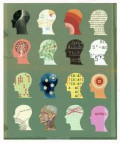Loss of Identity with a Psychiatric Diagnosis

With an increasing number of mental health problems being listed in the Diagnostic and Statistical Manual of Mental Health Disorders (DSM), it is not surprising that you have either had a diagnosed mental illness, currently have one or know someone who has one! For those who have never been diagnosed with a mental illness, I can tell you that somewhere on some page within the DSM you are likely to find a symptom or behavioural trait that you can identify with. Shocking isn’t it?
Being diagnosed with a mental illness is certainly no small thing. There is still a lot of stigma attached to it and it can be life changing. Many people go through a personal and profound change by way of their personal response or reaction to diagnosis. Add to this the reactions of family and friends, and it can result in a great upheaval or shift on a personal and social level. If the mental illness is prolonged or chronic and in a lot of cases lifelong, you can begin to lose sight of the person you used to be before diagnosis.
Hard Hitting Stigma Video
Importance of Identity
We all have an identity. It is precious to us. It defines who we are, how we fit in with society, how we perceive the world and how we are perceived by others. Each and every one of us is unique and from childhood onwards we start to identify with certain groups of people. Certain activities, behaviours and lifestyle generally, are often centered on what and who we identify with. For example:
Sam, a young, married father of two children is a teacher by day and a part time judo instructor by night. He has a love of football and watches his hometown play, taking his young 7 year old son with him to the matches. He also socializes regularly with his fellow workers. He identifies with his colleagues because they share common problems within the job and simply because they are ‘teachers’.
Belonging to a Group is Important

At a football match he feels he is one of the crowd, as if he belongs, because his fellow fans all share the same passion in cheering on their team. Most of them wear coloured scarves or t-shirts to identify with the team. He feels a part of something good. His primary role in life is as a husband and father but secondary to this he is a born leader, teaching by day and even by night though his other passion of judo. He is fulfilled in life though he gets stressed sometimes just like everyone else.
Not only is identity about fitting in socially but about how you see yourself. Everything in life has a personal and unique meaning to you that dictates how you see yourself, how you behave and respond. The emotional side of your personality provides the essence of knowing who you are. You know you better than anyone else with such things as:
- Your capabilities
- Your limits
- Self-esteem
- Confidence
- Strengths
- Weaknesses
- Aspirations, hopes and dreams
A feeling of belonging and a good self perception brings with it a sense of emotional security but imagine if this is tested by a mental illness.
Feelings after Mental Illness Diagnosis
Sam hasn’t been well. He has been getting mood swings and at times life is difficult at home and at work. His wife is worried about him because his moods are getting more severe. Some weeks are fine but then he becomes agitated again or other times he sits in stony silence staring. He is having problems sleeping and concentrating. He has had to take time off work three times in as many months and it is when he becomes terribly paranoid and deluded that a psychiatrist's advice is sought. Some time later it is decided that he has schizoaffective disorder and given medication.
After initial diagnosis of any mental illness, many people actually feel rather glad to have a recognized illness to explain why they have been feeling or behaving in a certain way. Obviously there will be exceptions to the rule but the relief can quickly be coupled with shock and soon you can begin to feel like a round peg in a sqaure hole.Everything seems to move quickly and standard treatments then follow in the form of medication and therapy
A Diagnosis of Mental Illness can Lead to Confusion

The medications have a tendency to make you feel very tired, especially at first but lethargy can remain constant for some people. At the least there is usually a feeling of dullness, as if you are not as sharp as you once were. If the mental illness needs long term or life long treatment (you are told!), you may find medications are changed periodically, as there may be fluctuations in the severity of your illness or medication tolerance. Side effects are common. In many cases your mental illness may be so bad that it interferes with work or you simply feel you can not work any more. If you are a parent, you simply have to soldier on regardless.
Books on Mental Illness
Sam’s wife is relieved though a little worried about her husband’s diagnosis. The medication seems to help sometimes but every few months he appears to get worse again and he ends up back in hospital and his medication is altered.
Sam’s world has changed. He gave up his teaching job even though his employers were very understanding. The bouts of extreme moods and paranoia keep coming back and he knows such a demanding job is beyond him. When he is feeling more stable he has glimpses of hope but after a mental health relapse his confidence crashes some more. He stopped the evening judo instructor classes before diagnosis and does not feel the confidence to start them up again. His work colleagues would visit him when he first had to take time off work but they contact him less and less and now only one of them rings occasionally but doesn’t visit. He has managed to go to one football match and hopes to keep doing so, illness permitting.
What has this diagnosis meant to Sam in terms of his identity?
Identity after Mental Illness Diagnosis
If we presume that Sam’s illness will be longstanding or life long, he will have to cope not only with his feelings about his illness but those of his family. How will his illness change his life and what will he have to deal with?
- The stigma so often attached to having a mental health disorder
- Loss of some of his former friends or work colleagues
- Employment problems given the unpredictability of his illness
- Possible side effects from the medications – such things as weight gain, tiredness
- Feelings of being a burden on his wife when he relapses
- Doubting his ability to be a good father
- A feeling of insecurity and helplessness within a world where he once felt confident and pro-active
Books to Inspire You on Mental Illness
Of course, therapy may help Sam alongside his medication but often these medications are meant for stabilization more than cure and often need to be altered if and when a relapse occurs. Medications for severe mental health problems are often deemed to be necessary for life. Most of them can make you feel dull and lethargic causing life to be an uphill struggle at times.
When you have chronic mental illness you can identify with others in the same position. I have seen many people who have such illness break away from society at large and cocoon themselves in their homes. I have also seen many whose only social life seems to revolve around mental health support groups in the community and online. This may be a good thing on the one hand but is definitely a sign of alienation too. It is a vicious cycle; the nature of the illness making one feel inept or of no productive use in society, which is further reiterated by stigma and discrimination.
When you realize that your identity has changed through a mental illness diagnosis, you need as much support as possible to break free from the self alienation and stigma induced alienation. I am glad to say that through new initiatives in the mental health system in the UK this is now being addressed. The only problem is that for those who have had a mental illness for many years, some will actually find comfort in remaining as they are. It has become part of their identity and ironically, they may be loathe to lose it. After so long it has become who they are and the main thing in life that they can identify with!
Living with Mental Illness
- Schizoaffective disorder | Mind
Mind is the leading mental health charity in England and Wales. We work to create a better life for everyone with experience of mental distress.
Useful Information
- About mental health services
Find information about mental health services in England and how to access them. - NAMI: National Alliance on Mental Illness - Mental Health Support, Education and Advocacy










